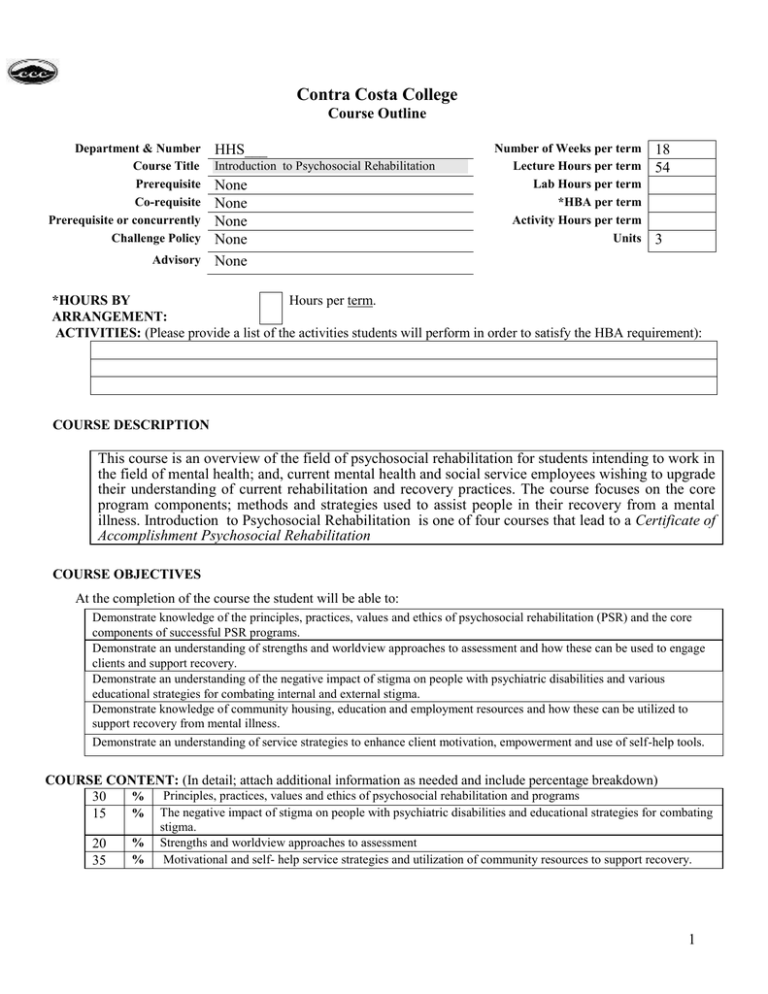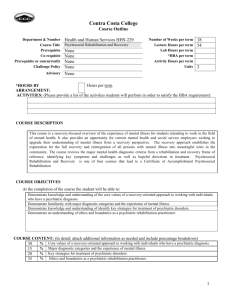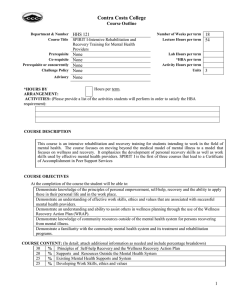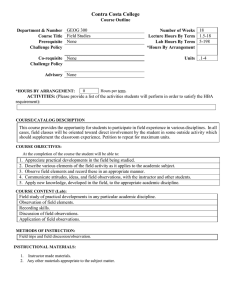HHS 228-F09.doc 104KB Feb 18 2014 10:43:38 AM
advertisement

Contra Costa College Course Outline Department & Number Course Title Prerequisite Co-requisite Prerequisite or concurrently Challenge Policy HHS___ Introduction to Psychosocial Rehabilitation None None None None Advisory None Number of Weeks per term Lecture Hours per term Lab Hours per term *HBA per term Activity Hours per term Units 18 54 3 Hours per term. *HOURS BY ARRANGEMENT: ACTIVITIES: (Please provide a list of the activities students will perform in order to satisfy the HBA requirement): COURSE DESCRIPTION This course is an overview of the field of psychosocial rehabilitation for students intending to work in the field of mental health; and, current mental health and social service employees wishing to upgrade their understanding of current rehabilitation and recovery practices. The course focuses on the core program components; methods and strategies used to assist people in their recovery from a mental illness. Introduction to Psychosocial Rehabilitation is one of four courses that lead to a Certificate of Accomplishment Psychosocial Rehabilitation COURSE OBJECTIVES At the completion of the course the student will be able to: Demonstrate knowledge of the principles, practices, values and ethics of psychosocial rehabilitation (PSR) and the core components of successful PSR programs. Demonstrate an understanding of strengths and worldview approaches to assessment and how these can be used to engage clients and support recovery. Demonstrate an understanding of the negative impact of stigma on people with psychiatric disabilities and various educational strategies for combating internal and external stigma. Demonstrate knowledge of community housing, education and employment resources and how these can be utilized to support recovery from mental illness. Demonstrate an understanding of service strategies to enhance client motivation, empowerment and use of self-help tools. COURSE CONTENT: (In detail; attach additional information as needed and include percentage breakdown) Principles, practices, values and ethics of psychosocial rehabilitation and programs % 30 The negative impact of stigma on people with psychiatric disabilities and educational strategies for combating % 15 20 35 % % stigma. Strengths and worldview approaches to assessment Motivational and self- help service strategies and utilization of community resources to support recovery. 1 METHODS OF INSTRUCTION Lecture, guest lectures, panel presentations Class discussion Student presentation Audiovisual Group discussion INSTRUCTIONAL MATERIALS Textbook Title: Author: Psychiatric Rehabilitation Pratt, Gill, Barrett, Roberts Publisher: Academic Press Edition/Date: Edition 2, 2007 COURSE EXPECTATIONS (Use applicable expectations) Outside of Class Weekly Assignments Weekly Reading Assignments Weekly Writing Assignments Weekly Math Problems Lab or Software Application Assignments Other Performance Assignments Hours per week 3 2 1 STUDENT EVALUATION: (Show percentage breakdown for evaluation instruments) 20 40 20 20 % % % % Midterm Exam Written Assignments Class Participation Final Paper and Oral Presentation GRADING POLICY (Choose LG, CR/NC, or SC) x Letter Grade Pass / No Pass Student Choice 90% - 100% = A 80% - 89% = B 70% - 79% = C 60% - 69% = D Below 60% = F 70% and above = Pass Below 70% = No Pass 90% - 100% = A 80% - 89% = B 70% - 79% = C 60% - 69% = D Below 60% = F or 70% and above = Pass Below 70% = No Pass Prepared by: Aminta Mickles Date: 10/3/09 2 3


